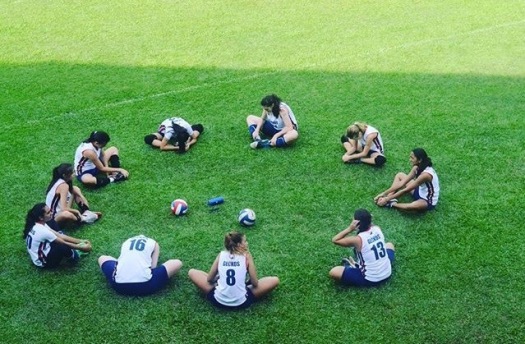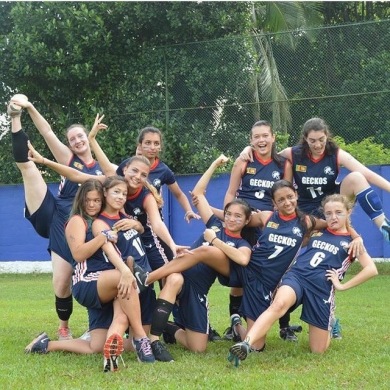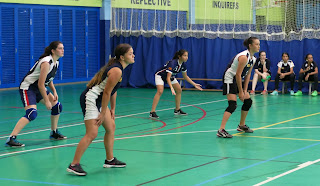Action: Volleyball
The volleyball season this year started off
well enough, but the absence of last year’s seniors was pretty obvious. Our
captain last year, Greta, who was an amazing player who we relied on almost a
little too much, and one of our main setters and solid servers, Athena, were
integral parts of our team, and their leaving greatly affected the team
dynamics. Not only did we have to prepare for the arrival of new players we also
had to shift from old positions.
Elizabeth and Prerna stepped up into
leadership roles beautifully, and I am trying to become a solid power hitter
and overhand server to make up for the loss of Greta’s and Athena’s skills in
these areas. Last year I was a semi-reliable hitter and solid underhand server,
but this year I was able to improve the power behind my spikes as well as their
manoeuvrability and I recently upgraded from under- to overhand serves,
although they are harder for me to aim than the underhand (Increased their awareness of their own strengths and areas for growth and Develop new skills).
This year’s team
does not include any outstanding volleyball skills, so our main focus was to
work on teamwork to make up for each other’s faults (Worked collaboratively with others). While this is a good
strategy, it was hard to put into practice because of the lack of communication
as well as the weak grasp of the basic skills such as receiving and serving.
Communication in volleyball is key, as the cooperation between team members is
dependent on whether or not they know what the others are doing, and the lack
of it is probably to do with the new players being reserved about playing aggressively.
Greta’s strategy for bringing out aggressiveness in her players was to get into
their space and try to make them mad. Sometimes she would run to the other side
of the court shouting for the ball to prove this point. While this strategy
helped me realize that the only way I would be able to get the ball was by communicating
(loudly) what I was doing, it can be limited by the players reacting
differently and becoming completely complacent and overly dependent on Greta playing
the ball (which was the case for us when we realized how much her absence
affected the team this year).
This focus on teamwork was tested during our
practice matches against local schools, who were very reliant on a single star
player like we were last year. We were also able to play against a team who
normally plays professionally, and we learnt a lot during that match, such as
how we need to work on properly covering the blockers and hitters to easily receive
loose balls.
SAISA this year was initially supposed to take place in Dhaka, but
because of security reasons it will be held here in Colombo. This is a huge
advantage for us as we were practically scrambling for players that could get a
travel visa for Bangladesh, and now we are able to play with a full team, which
includes our power server Anna who was not allowed to travel. Playing as last
year’s undefeated champions on our home turf is a little daunting, but I am
confident that we will give our opponents a run for their money (Shown perseverance and commitment in their activities).
(Credit: Andre Joubert)
Service: Checkmates
Service this semester started off with the
Service fair, where students could talk to the leaders of each service group to
get a better idea of the different options available to them before choosing
their group for the semester. After deciding last year that I would like to
join a different group from Alzheimer’s (Undertaken new challenges), I settled
on a new group called the Checkmates.
(Credit: Mr Lockwood)
The Checkmates’ general purpose is to
teach chess skills to students from an underprivileged school so that they can
have a better chance at winning a chess scholarship, which are very highly
coveted and sought after in Sri Lanka (Engaged with issues of global importance
and Considered the ethical implications of their actions).
The first few
sessions involved getting to know each other and our service leaders, Arnold
and Nela, and our supervisor, Mr Canizalez, as well as brushing up on our chess
skills (Increased their awareness of their own strengths and areas for growth
and Develop new skills). In recent sessions we began planning what we would do
for the rest of the year, and making a presentation about chess for the
students we would be teaching (Planned and initiated activities and Worked
collaboratively with others).
(Credit: Sho)
In the last session we were visited by students
from Nalanda School who play chess extremely well, so that we can learn a bit
more about the game to pass it on to the other school’s students.
Creativity: Piano lessons
My progress in achieving my goals for Creativity
are slow going compared to Service and Action. While I am still developing my
piano skills, I am still struggling with playing an entire piece perfectly, and
my practice time is hampered by academics and other work (Increased their
awareness of their own strengths and areas for growth).
The first step I need
to take to complete my goal is to choose a particular piece to become fluent
in, as opposed to what I was doing previously by trying to only adequately play
a bunch of pieces (Planned and initiated activities). In regards to my goal of learning
how to instinctively read sheet music, that can only be achieved through lots
of practice (Shown perseverance and commitment in their activities).


























